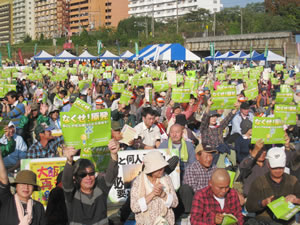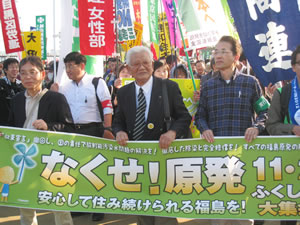The Present Situation in Fukushima and Issues Facing@the Movement to End Nuclear Power
ODAGAWA Yoshikazu, secretary-general of the National Confederation of Trade Unions (Zenroren), spoke at a rally held on November 3, 2013 in Fukushima City to share experiences and opinions to develop the movement to end nuclear power.
Two years and eight months have passed since the nuclear disaster at Tokyo Electric Power Company (TEPCO) Fukushima Daiichi nuclear power plant. The crisis there is far from winding down as the plant continues to leak highly radioactive water. On October 21, The Washington Post said, "Japan's effort to clean up what remains of the Fukushima Daiichi power plant is turning into another kind of disaster". Local fishers are being forced to give up resuming fish catching. People who left their hometowns due to the crisis are being discouraged from returning. The crisis continues to scare the rest of the nation and the world, thus adding to the difficulty experienced by all those people who are doing their utmost to recover as early as possible from damage caused by the March 11, 2011, earthquake and tsunami.
Prime Minister ABE Shinzo would not face up to these realities. In his speech at the International Olympic Committee's general assembly, he called for support to Tokyo's bid for the 2020 Summer Games by stating: "Let me assure you the situation is under control," adding, "The effect of radioactive substances in the nearby waters is blocked within 0.3 square kilometers of the plant harbor." "There have been no health problems and nor will there be. I will be taking responsibility for all the programs with regard to the plant and the leaks," he said. He is not telling the truth at all.
 The local assembly in Namie Town, Fukushima Prefecture, adopted a resolution in protest against the prime minister's irresponsible remarks. Criticism has arisen at home and internationally. But Prime Minister Abe remains so defiant as to reject all these criticisms and calls for the remarks to be retracted. This is how the victims are being made to suffer even more. The local assembly in Namie Town, Fukushima Prefecture, adopted a resolution in protest against the prime minister's irresponsible remarks. Criticism has arisen at home and internationally. But Prime Minister Abe remains so defiant as to reject all these criticisms and calls for the remarks to be retracted. This is how the victims are being made to suffer even more.
Prime Minister Abe's stance toward the ongoing nuclear crisis is closely linked to his fallacy driving his government into putting the nation's nuclear reactors back online without determining the cause of the Fukushima Daiichi accident or taking responsibility for the accident. He is even promoting nuclear plant sales abroad as part of the government's economic policy. An Asahi Shimbun poll in early October found that 76 percent of the respondents said they do not support Prime Minister Abe's assurance that the crippled nuclear reactors are under control.
Even after the Nuclear Regulation Authority (NRA) established new safety standards and after utilities applied for safety examination, a majority of the public is opposed to restarting nuclear reactors, according to most of opinion surveys. This shows that a major change has taken place in public opinion since the accident at Fukushima Daiichi. An increasing number of people are demanding Japan go without nuclear power. But both the government and TEPCO would not respond to the call for zero-nuclear policy. This is why contradictions are intensifying day after day.
The Abe administration is poised to take political decision to give the green light to the restart of nuclear reactors without making efforts to stop highly radioactive water leaks. The biggest task now is for us to build up a great national movement to isolate the administration.
At the same time, the government must face up to the fact that about 150,000 people have been forced to evacuate their homes and endure difficult living conditions due to the nuclear disaster. Fukushima's people are demanding the earliest possible settlement of the problems caused by the nuclear accident and full damages to be paid to the victims. While fighting to get all the Fukushima Daiichi reactors decommissioned, they are demanding that the government fulfill its responsibility to bring the accident to an end, carry out decontamination, and pay damages.
Radioactive water leaks remain the most crucial issue
Accidents are frequently occurring at the Fukushima Daiichi nuclear plant due to a shortage of workers. Unable to transfer rainwater containing radioactive substances to containers, the plant operator has been forced to release it into the compound of the plant and transfer into a reservoir. The disposal of contaminated water is clearly reaching its limits. Eight hundred to 1,000 tons of groundwater is flowing out of the mountain side everyday into the ocean. An estimated 400 tons of the water is flowing into the damaged reactor building. No one knows for sure the amount of radioactive substances in groundwater flowing into the ocean. The operator cannot tell exactly about the state of reactors, about the amount of contaminated water that is leaking out, and about possible measures to be taken to prevent the leakage.
The task now is for us to press the government to examine the contaminated water, the flow of water within the compounds, and the contamination of the ocean, to make public the findings, to retract the government declaration that "the crisis at Fukushima Daiichi nuclear power plant is over," and to develop and implement plans to deal with the crisis by using all knowledge and know how.
Fierce confrontation with government and utilities over putting nuclear reactors back online
On June 19, the Nuclear Regulation Authority approved new standards for nuclear reactors in case of earthquakes, tsunami, and other severe accidents, providing safety standards for assessments regarding the NRA's actions based on the Nuclear Reactor Law. On June 20, the Cabinet amended an order to allow nuclear reactors to operate for up to 60 years instead of 40 years as originally designed. The government is intent on giving the green light to the restart of nuclear reactors regardless of any problems. The point is that there are political initiatives in putting the restart of reactors before ensuring nuclear safety. We must be on guard against any such political moves intended to create new "safety myths" about nuclear power.
Although the Liberal Democratic Party won a landslide in both the House of Councilors election and the House of Representatives election, the public is on the whole opposed to the restart of nuclear reactors. A group "Yoron no Chikara" (Power of public opinion) chronologically provides information on its Website on various opinion surveys. It shows that 61.0 percent of the surveyed said they are in favor of ending nuclear power as of May 2011. The percentage remained almost unchanged at 60.9 percent as of January 2013. A Mainichi Shimbun survey conducted on July 27-28, shortly after the House of Councilors election, 56 percent said they are opposed to restarting nuclear reactors. The public's firm opposition is clear from protest actions held in various places across the country.
The "Metropolitan Coalition against Nukes", the "10 Million-people Action to Bid Farewell to Nuclear Power," and the National Liaison Council to Abolish Nuclear Power have held massive actions calling for a Japan without nuclear power.
"No Nukes Day" actions on June 2, 2013 were attended by 85,000 people, helping to create an anti-nuclear atmosphere in the Japanese capital of Tokyo shortly before the House of Councilors election.
About 40,000 people took part in "October 13 No Nukes Day" actions held jointly by the three anti-nuclear groups.
 The weekly anti-nuclear rally held every Friday near the National Diet (parliament) has been continuing without interruption since March 2012, echoed by similar local actions in many places. The weekly anti-nuclear rally held every Friday near the National Diet (parliament) has been continuing without interruption since March 2012, echoed by similar local actions in many places.
These actions have encouraged young people, women and other ordinary people, who in the past distanced themselves from politics, to voluntarily participate in such protest actions. This is how the anti-nuclear movement is growing.
Changes have taken place since March 11, 2011, in public awareness and levels of the movement. There are more and more favorable conditions for developing united action for the single demand for Zero-Nuclear Japan, regardless of political orientation, in the course of confrontation with the government and electric power companies.
|

